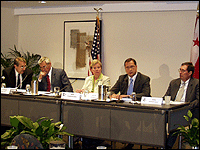Registration
You will receive an email confirming your registration.
On September 20, 2006, the Carnegie Endowment for International Peace hosted a meeting entitled “Beyond Nuclear Deterence: Transforming the US-Russia Equation” to commemorate the publication of the new book of the same title. Speakers included the co-authors of the volume, Alexei Arbatov (Carnegie Moscow Center) and Vladimir Dvorkin (Institute for World Economy and International Relations), as well as contributor John Steinbruner (University of Maryland). Rose Gotemoeller, Director of the Carnegie Moscow Center, chaired the session. Arbatov, Dvorkin, and Steinbruner’s remarks and the Q&A that ensued are summarized below.
IMGXYZ526IMGZYX
Alexei Arbatov: Given the current state of US-Russia relations and the fact that disarmament is not foremost on our agendas, stockpiles of nuclear weapon on both sides will remain large. In this environment, is it possible to go beyond nuclear deterrence in the US-Russia strategic relations? That is the question we explore in this book.
We also examine whether it would be beneficial to remain under a nuclear deterrence regime. After all, it served a purpose during the Cold War and arguably prevented a third world war. However, the US and Russia can not afford to stay in their current mode of strategic relations if they hope to cooperate on new and increasingly important strategic problems such as controlling nuclear weapons proliferation and combating transnational terrorism.
We conclude that it is possible to successfully replace the nuclear deterrence regime, but not if we continue the current “ostrich” policy of sticking our heads in the sand and ignoring the problem. Rather, it can only be done away with through continued bilateral and multilateral engagement and maintenance of sufficient nuclear arsenals. If the US and Russia continue to ignore the problem of nuclear deterrence, it will not disappear by itself and will continue to cause tension in their relationship.
Nuclear deterrence has present several paradoxes in the preceding years. It survived the Cold War, and the death of the one of the major powers of the Cold War era. Furthermore, instead of abandoning nuclear deterrence, the US and Russia have effectively done away with arms control.
We need to tackle the challenge of bilateral and multilateral relations among nuclear weapon state. It is not really possible right now for Russia and the US to have a nuclear relationship akin to that of Great Britain and France, which have not negotiated any nuclear agreement but remain peaceful toward each other. The US and Russia do not have a treaty organization like NATO to bind them together, and thus the relationship requires continuous engagement.
Vladimir Dvorkin: US-Russia relations have not changed. Catastrophic events have brought us together, but the relationship has not really become closer. Even if we suddenly became strategic partners, it would not solve the technical problems of deterrence on the military level. Their policies would remain just as strict. The approximately 2000 warheads maintained by both sides will not find targets anywhere else than on each others territory.
Political steps must be taken by the US, Russia, and the P-5 to show that they are lowering their dependence on nuclear deterrence. Organizationally, the position of launch-on-warning and readiness for launch-on-warning should be decreased. Unfortunately, this idea was rejected by top commanders, showing that even the highest levels of command do not fully understand the structure of strategic forces and the relationship between the US and Russia.
In writing the book, we looked at all of the technical steps in the readiness for missile launch procedures and the verification procedures in the START I agreement. Our study was the first to look at all of the details involved in these processes.
Organizational and technical changes are not the only ones that transform the policy of deterrence. Joint projects also change this relationship. Many joint projects, however, are stalled by bureaucratic obstacles. For example, the Joint Data Exchange Center is not operational despite the fact that the memorandum was signed in 2002. The delays, in turn, are harming bilateral cooperation.
There are proposals in the book on how to cooperate on strategic anti-ballistic missile deference that if adopted would prevent crises. However, these proposal are predicated upon stable relations between the US and Russia. Relations between countries change quickly, and things now are not that stable. We need to improve our cooperation in order to ensure that our nuclear relationship will survive under any conditions.
John Steinbruner: The termination of deterrence process and transformation of the relationship between US and Russia is overwhelmingly in American interests. Current operation practices and embedded Cold War practices create the conditions for a massive accident to occur, for an inadvertent triggering, or the deliberate triggering by a terrorist group. It is peculiar that we choose to ignore the problem.
In addition to inherent problems, the current practice precludes creating higher standards of managerial control over weapons and fissile material in regard to terrorist aversion. In short, there should be a lot more interest in this subject and book.
Summary prepared by Nathanael Stice, Junior Fellow with the Russian and Eurasian Program at the Carnegie Endowment for International Peace.
